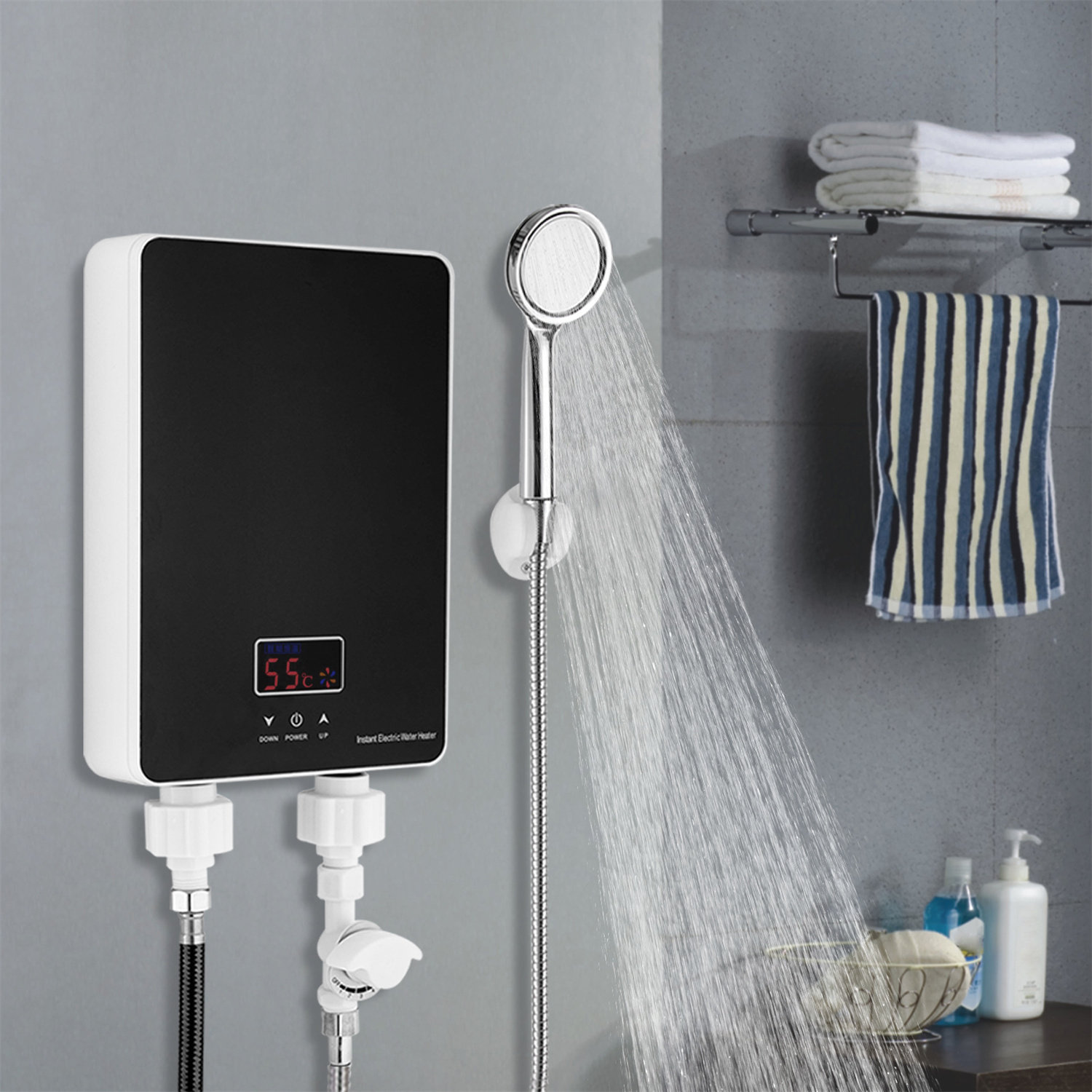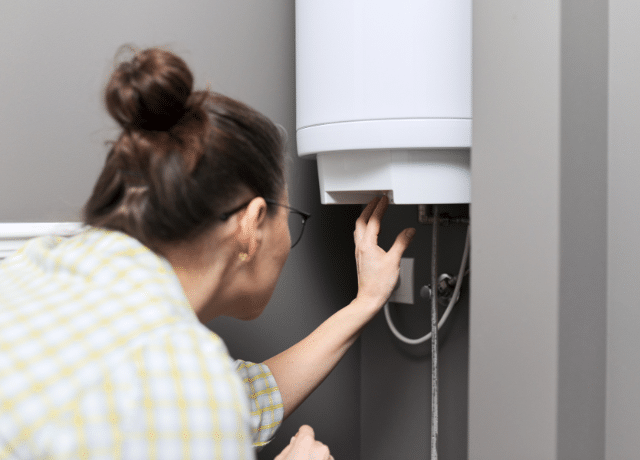Top Drivers Why Tankless Water Heaters Are Beneficial
Top Drivers Why Tankless Water Heaters Are Beneficial
Blog Article
This post on the next paragraphs relating to Pros and Cons of Tankless Water Heater is immensely intriguing. Give it a try and draw your own results.

In a world where ease and effectiveness reign supreme, it's no surprise that house owners are frequently in search of smarter methods to handle their home's energy usage and comfort. One innovation that has actually gradually gotten popularity is the tankless hot water heater. However exactly what makes these systems stick out from the traditional tank-based models the majority of us grew up with? Allow's dive in and explore the benefits of tankless hot water heater, aiding you decide if it's time to make the switch in your home.
Introduction
Image this: you enter the shower after a long day, expecting a soothing cascade of hot water, only to be greeted by icy beads due to the fact that the last individual utilized it all up. Sound familiar? Traditional water heaters store a set amount of hot water, implying you're at the mercy of that tank's supply. Tankless systems, on the other hand, warmth water on demand. Say goodbye to running out mid-shower, say goodbye to fumbling with routines just to make sure hot water is offered.
Comprehending Tankless Water Heaters
What Are Tankless Water Heaters?
Tankless water heaters, sometimes known as on-demand or instantaneous hot water heater, provide hot water only as it's needed. Instead of storing gallons of pre-heated water, these systems kick into action the moment you activate the faucet. Water travels through a warmth exchanger, warming up in real-time, implying you get a continuous circulation of hot water without the requirement for a large tank resting idly by.
How Do They Vary from Standard Systems?
Typical heaters hold a tank of warm water, using energy to keep that tank at a constant temperature. Tankless systems get rid of the standing supply, lowering thrown away power and the cumbersome impact of a big cylinder. Essentially, you're upgrading from a "accumulation" frame of mind to a "made-to-order" approach.
Usual Sorts Of Tankless Systems
Tankless water heaters typically come in two selections: gas and electric. Gas models often tend to deliver higher circulation rates, perfect for bigger households, while electric models commonly serve smaller sized homes and are generally much easier to mount. Furthermore, some systems are made for point-of-use (offering one component) while others can handle the entire home's warm water requirements.
Secret Benefits of Tankless Hot Water Heater
1. Countless Hot Water Supply
Ever before needed to schedule showers so everyone obtains their fair share of hot water? With tankless, that comes to be a distant memory. As long as the heater's circulation capability isn't exceeded, you can take back-to-back showers without turning into a popsicle.
2. Power Efficiency and Price Cost Savings
Say goodbye to heating up a titan tank's well worth of water and maintaining it warm all day. Tankless heating units lower standby energy losses, which can decrease utility expenses. While the preliminary cost might be higher, the lasting cost savings usually validate the investment.
3. Space-Saving Layout
If your home is short on storage space, eliminating the large tank frees up valuable room. Tankless systems are compact and can usually be placed on walls, concealed in corners, or set up in tight energy closets without monopolizing the whole space.
4. Longer Life-span
A well-kept tankless hot water heater can outlast its tank-based cousin. Traditional storage tanks might last 10-15 years, while tankless designs can maintain chugging along for 20 years or more, making them a strong financial investment in time.
5. Improved Water High Quality
Storing water in a storage tank can occasionally cause debris buildup or a slightly "off" preference. With tankless systems, fresh water is heated up on the spot, lowering the possibilities of sediment accumulation and potentially supplying cleaner-tasting water.
Considerations Before Switching
Though the benefits are engaging, it's important to take into consideration a couple of elements before totally dedicating.
Initial Financial Investment Expenses
Tankless heating systems normally come with a greater in advance price tag. In between the system itself and potential installment adjustments, the initial expense could provide you sticker label shock. But bear in mind to watch it as a long-lasting investment.
Installation Requirements
Depending on your home's infrastructure, you might require additional electrical capacity or gas line upgrades. Ensure you understand the setup requirements and speak with an expert to stay clear of surprises.
Reviewing Your Home's Water Usage Patterns
If your house at the same time makes use of multiple components with high warm water demand, make certain the unit's circulation rate fulfills your demands. Understanding your use patterns aids you pick the appropriate dimension and type of tankless heating system.
Maintenance and Care Tips
Tankless systems are relatively low upkeep, but they aren't set-it-and-forget-it appliances.
Regular Cleaning and Descaling
Hard water minerals can build up in the heat exchanger, affecting effectiveness. Routine descaling (usually advised each year) maintains the system performing at peak performance.
Annual Professional Inspections
A yearly checkup from a professional makes certain small problems are caught early. They'll analyze the device's performance, look for leakages, and assist maintain optimal performance.
Making Sure Proper Air Flow
For gas designs, proper ventilation is important to securely expel exhaust gases. Ensure venting systems are clean and appropriately set up to avoid any type of possible security dangers.
Comparing Different Brands and Versions
Not all tankless hot water heater are created equal.
Investigating Dependable Producers
Try to find reliable brand names with a background of creating quality units. A reputable supplier often provides much better consumer assistance and longer warranties.
Reading Reviews and User Responses
User testimonials and feedback from neighbors or friends that have gone tankless can offer useful insights. Often, real-life experiences can be much more informing than marketing pamphlets.
Setup: Do It Yourself or Professional?
While some house owners cherish tackling projects themselves, tankless installment could not be the best time to break out the toolbox.
Benefits and drawbacks of Do It Yourself Installment
A do it yourself mount can save cash, but it includes threats. Inaccurate installment can lead to inadequacy or safety issues. If you come in handy and have experience, it might be possible-- yet wage caution.
When to Call an Expert Plumber
For a lot of, calling a professional makes certain everything's done correctly. An expert plumbing professional recognizes neighborhood codes, sizing requirements, and venting parameters, reducing the danger of mishaps.
Making the most of Efficiency
You have actually bought a tankless system-- currently maximize its efficiency.
Ideal Temperature Settings
Many people set their units in between 120-140 F. Adjusting the temperature can improve convenience and savings. Experiment to find a pleasant place that does not lose energy.
Coupling With Low-Flow Fixtures
Want to stretch your system's capabilities? Think about mounting low-flow showerheads and taps. They minimize water use, enabling your tankless system to deliver a steady stream of warm water without straining.
Ecological Effect
Tankless water heaters line up with greener living goals.
Lowered Carbon Footprint
By utilizing less power and only home heating water as required, tankless systems can decrease your home's carbon footprint, decreasing your ecological influence.
Conserving Natural Resources
Less power intake and much less wasted hot water translate into fewer natural resources being made use of, an ecological win-win.
That Profits Most from Tankless Heaters?
The beauty of tankless heating systems is that they can fit a range of families.
Big Households vs. Single Residents
Big families might enjoy the countless warm water supply, while single passengers appreciate the energy financial savings from not heating up an entire container for simply a single person's morning shower.
Homeowners with Minimal Area
If your home is short on square footage, shedding the bulky container maximizes room for various other essentials-- or perhaps just a lot more elbow room.
Eco-Conscious Customers
Going tankless aligns with eco-friendly values, ensuring you're not throwing away energy or resources.
Future Trends in Tankless Water Heaters
The globe of home devices is ever-evolving, and tankless hot water heater are no exemption.
Smart Home Integration
Envision adjusting your water heater's temperature level using an app or obtaining upkeep informs on your phone. As smart home technology advancements, we'll see even more connectivity and ease.
Developments in Modern technology
R&D is regularly boosting warm exchangers, making devices more effective and long lasting. Future versions might be even quieter, extra compact, and better fit for differing environments.
Verdict
Picking a tankless water heater is more than simply updating your home's warm water system; it's investing in long-term convenience, power effectiveness, and a greener lifestyle. By considering your house's water use, being mindful of installment demands, and devoting to normal maintenance, you can appreciate a consistent stream of hot water without the luggage of a bulky storage tank. As innovation develops, you can look forward to also smarter, more effective tankless services that not only make your life simpler yet also benefit the planet.
Why You Should Consider a Tankless Water Heater for Your Home
Energy Efficiency and Cost Savings
Tankless water heaters, also known as on-demand water heaters, heat water only when needed. This means they don't waste energy keeping a tank of water hot constantly. This efficiency translates into substantial cost savings on your monthly energy bills.
Endless Hot Water Supply
One of the significant advantages of tankless water heaters is their ability to provide a continuous supply of hot water. Traditional tank water heaters have a limited capacity and can run out of hot water, especially during peak usage times. In contrast, tankless water heaters can provide an endless stream of hot water, making them ideal for larger families or homes with high water usage.
Space-Saving Design
Tankless water heaters are compact and take up significantly less space compared to traditional tank heaters. They can be installed on walls, under cabinets, or even outside, freeing up valuable space in your home. This makes tankless water heaters a great option for smaller homes or properties with limited space for a traditional water heater.
Longer Lifespan and Lower Maintenance
Tankless water heaters typically have a longer lifespan compared to traditional tank heaters. They can last up to 20 years or more with proper maintenance. Additionally, tankless systems are designed with replaceable parts, which can extend their lifespan further and reduce long-term maintenance costs.
Environmentally Friendly
Reducing energy consumption not only saves you money but also benefits the environment. Tankless water heaters contribute to a smaller carbon footprint by using less energy to heat water. Their energy efficiency and ability to minimize standby heat loss make them an eco-friendly choice for environmentally conscious homeowners.
Customized Temperature Control
Tankless water heaters offer precise temperature control, allowing you to set the desired temperature to meet your specific needs. This level of customization ensures you always have water at the perfect temperature for your comfort and usage requirements.
https://beantownservices.com/blog/consider-tankless-water-heater-for-your-home

As a keen reader on Six Benefits of a Tankless Hot Water Heater, I figured sharing that piece of content was a good idea. Kindly pause to share this blog if you enjoyed it. Thanks for your time. Revisit us soon.
Learn More Report this page